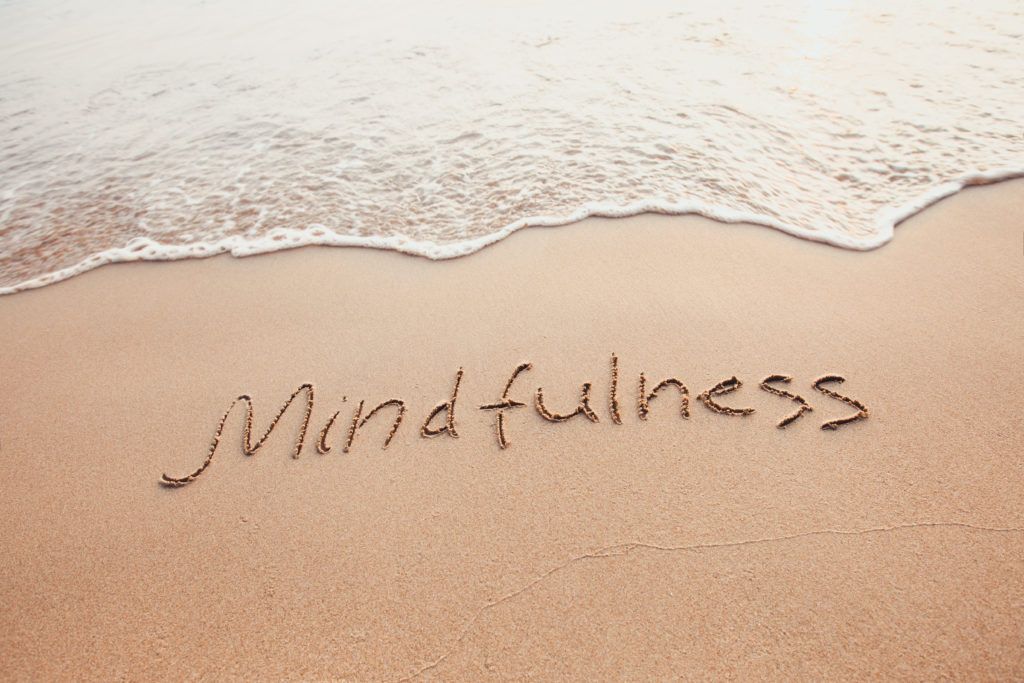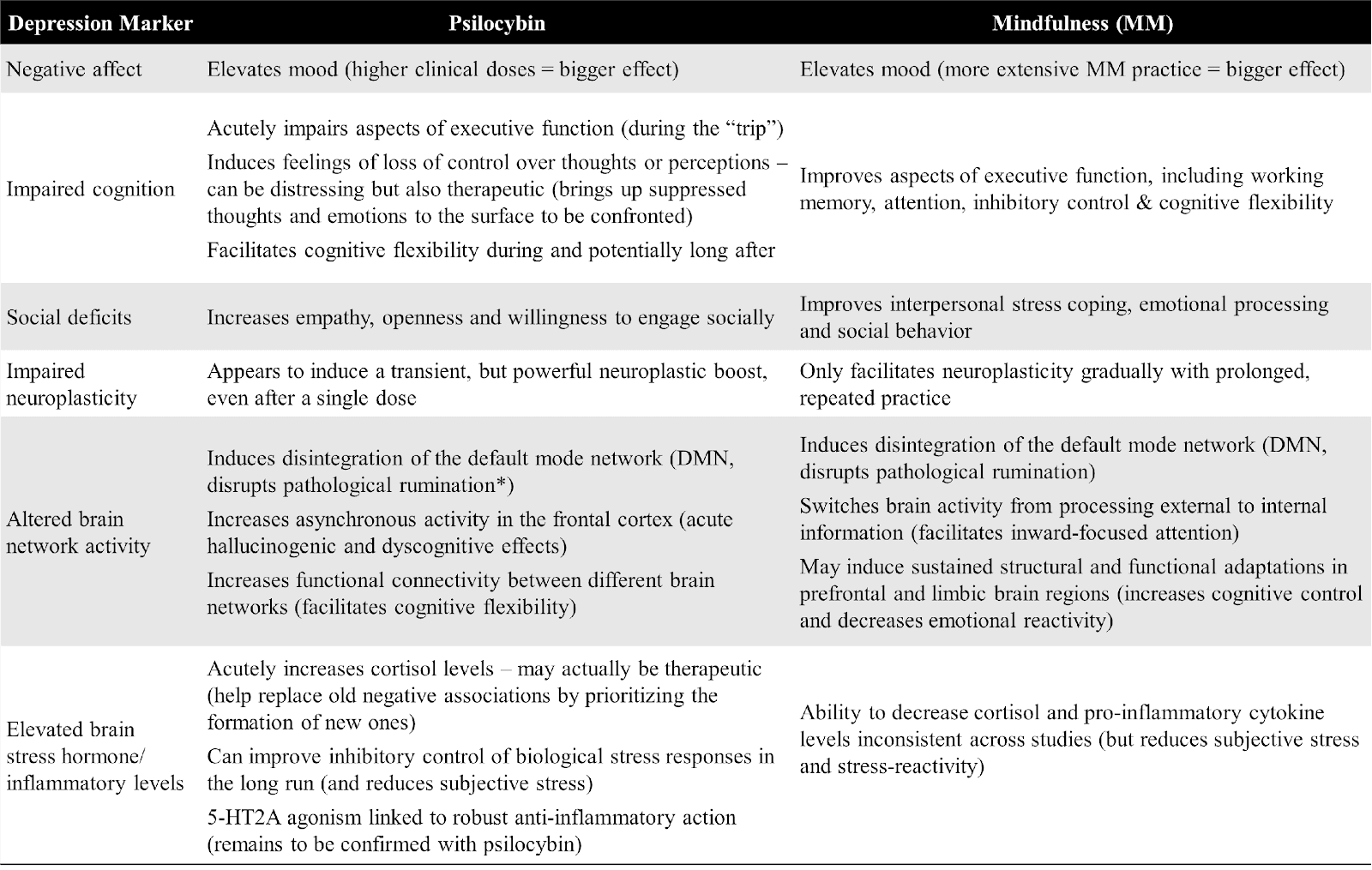
Current treatment options for those suffering from depression are inadequate at best. This is especially true for the one-third of all depressed patients who are labelled as “treatment-resistant” after failing to respond to two or more traditional antidepressant drugs.1 On top of their low response rates, classical antidepressants are plagued by a slow onset of action and various side effects. These realities highlight the urgent clinical need for better antidepressant treatments to address a global pandemic of a different kind.
Psilocybin and mindfulness meditation represent two promising alternative approaches in the field. Emerging data on psilocybin’s safety and efficacy in depression led to its FDA (US Food and Drug Administration) designation as a breakthrough therapy in 2018.2–7 Psilocybin is converted in the body to its active metabolite, psilocin, which binds to the serotonin 5-HT2A receptor. It can help depressed patients break down negative, rigid patterns of thinking through deep personal insights and flexible cognition.
Mindful meditation (MM) is the mental practice of focusing on being in the present in a relaxed, non-judgmental, and accepting way. Mindfulness-based cognitive therapy has been reported to be effective in treating depression, and in preventing symptom relapse.8–11 Through persistent practise, patients learn to develop mental strategies for better emotional self-regulation and stress coping.
Antidepressant Efficacy of Psilocybin and Mindfulness
Emerging evidence now suggests that depressed patients may benefit from the combination of psilocybin and MM.12,13 A recent review published in Frontiers in Psychiatry pooled data from 93 relevant published studies.12 By looking at six clinical markers of depression, Kristin Heuschkel and Kim Kuypers broke down the antidepressant effects of psilocybin and MM individually. At the time, there were no published clinical data on the use of psilocybin and MM in conjunction, leaving them to hypothesize about potential complementary effects based on what is known about their individual effects. The potential benefits of this combination therapy, and the need for future studies on this topic, were underscored.
The clinical/physiological markers of depression discussed were: 1) negative affect, 2) impaired cognition, 3) social deficits, 4) impaired neuroplasticity, 5) altered brain network activity, and 6) elevated stress hormone/inflammatory levels in the brain.12 The findings of this review are summarized in Figure 1.

Figure 1: (click to enlarge) Summary of pooled analysis by Heuschkel and Kuypers.12 Psilocybin and mindfulness meditation (MM) have unique effects on each of the six key clinical markers of depression analyzed. Note: Rumination is the excessive focus on negative thoughts implicated in conditions such as depression.
Briefly, the pooled data revealed that psilocybin and MM both exert long-lasting positive effects on mood, social skills, and neuroplasticity, with different effects on executive functioning, brain network activity, and stress hormone/inflammatory responses. It is expected that the two approaches will have synergistic actions by potentiating and/or prolonging mutual therapeutic effects.
Combination May Maximize the Therapeutic Benefits
The limited but encouraging clinical data supports the combination of psilocybin and mindfulness meditation for treating depression. Importantly, according to Heuschkel and Kuyper’s analysis, MM seems to facilitate psychedelic-induced peak experiences or “breakthroughs”, which are positively correlated with treatment response. MM may also extend the psychedelic “afterglow,” or the persisting feeling of elevated and energetic mood often reported in the days to weeks following a trip. Additionally, MM can provide a better sense of control during the acute psychedelic experience, thus minimizing adverse drug events. Psilocybin can, in turn, open up a window of opportunity for successful MM-based therapy as sustained increases in both mindfulness and neuroplasticity are observed following a psychedelic treatment.12,14
It is important to note that complementary or synergistic effects of the two treatments were speculative or anecdotal at the time of Heuschkel and Kuyper’s paper. Since then, the first double-blind study of the combination of psilocybin and MM was published.13 The small trial suggests, as predicted, that psilocybin can amplify the positive effects of mindfulness meditation practice while MM reduces the likelihood of a bad trip.
One thing is clear, more placebo-controlled, double-blind, randomized trials are needed to determine whether psilocybin-assisted mindfulness-based therapy is effective for treating depression. Trials could compare psilocybin with MM to each treatment alone, MM along with classical antidepressant drugs, or the combination of conventional pharmacotherapy and psychotherapy. Time and future research will tell.
